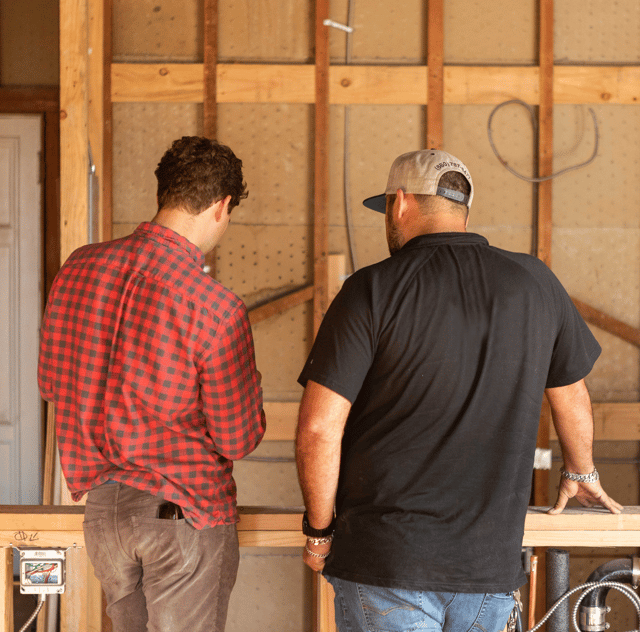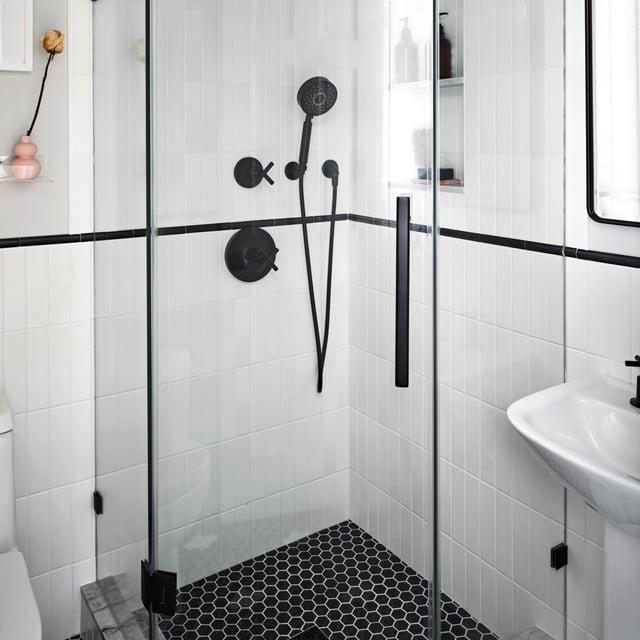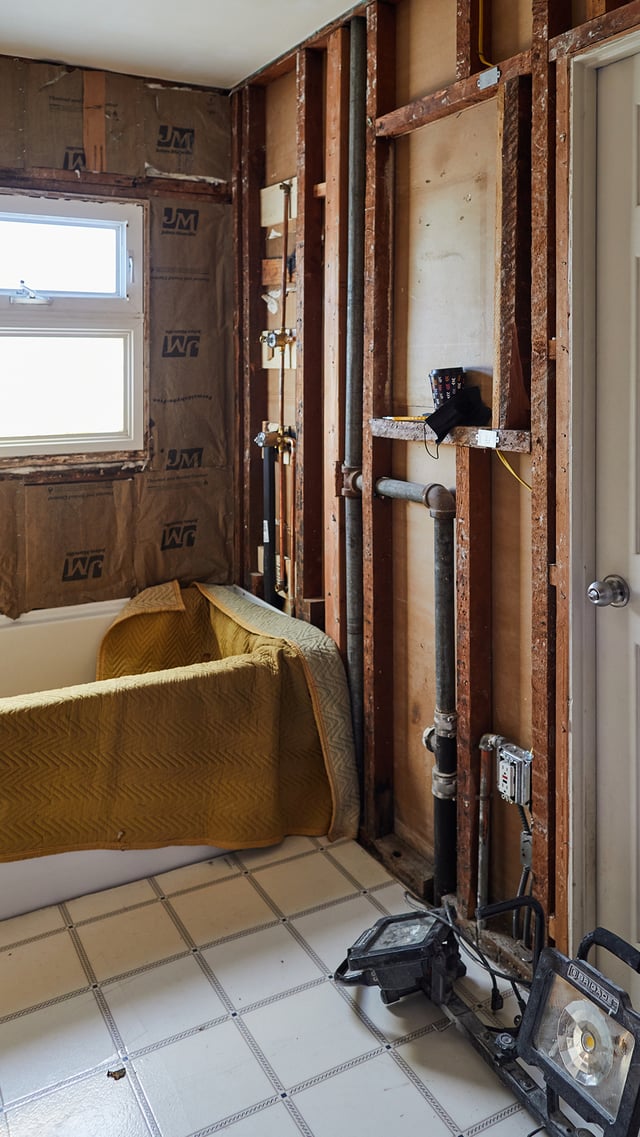
Working with Contractors
The Block Way of Renovating: A Complete Homeowner’s Guide
11.24.2025


In This Article
Home remodeling is one of the most exciting yet often challenging experiences a homeowner can undertake. Whether you’re dreaming of a sleek, modern kitchen or a tranquil bathroom oasis, bringing those visions to life requires more than creativity—it requires hiring the right people to get the job done correctly and efficiently. This comprehensive guide will walk you through every step of finding, vetting, and hiring the best general contractor (GC) for your home improvement project in 2024.
From understanding what a GC does to avoiding common pitfalls, this guide is designed to ensure that your remodeling journey is as smooth and stress-free as possible. By following these steps, you’ll be well on your way to a successful renovation that meets your expectations.
A general contractor, often abbreviated as GC, is the person who manages the entirety of a construction project, whether it’s a small bathroom remodel or a major home renovation. They serve as the project manager, ensuring all work is completed on time, within budget, and to the required standards. Their role includes:
The GC essentially acts as a middleman between the homeowner and the various subcontractors or teams involved in the renovation. They ensure that all parts of the project fit together seamlessly so that you don’t have to worry about managing individual contractors or checking if the work is being done correctly. Essentially, they oversee the project from start to finish, ensuring it meets your standards, and their primary responsibility is to make sure your vision comes to life.
While it may be tempting to act as your general contractor to save money, the role of a GC is far more complex than most homeowners realize. Renovations often involve various trades working simultaneously—plumbers, electricians, painters, carpenters, and sometimes even structural engineers. Without a GC coordinating these tasks, scheduling can quickly become chaotic, leading to delays, increased costs, and significant stress for the homeowner.
Another reason why GCs are critical is their knowledge of building codes and legal requirements. Whether your project is large or small, certain renovations often require permits from your local government, and failing to comply with building codes can result in hefty fines or even having to undo work that has already been completed. A qualified GC will know how to obtain the right permits and ensure that all work is up to code, protecting you from these issues.
The role of a general contractor has evolved over the years, particularly with the rise of technology and modern project management tools. In 2024, many GCs are integrating advanced software into their operations, providing clients with real-time updates on progress, timelines, and budgets. Some even use 3D modeling tools to give homeowners a virtual walk-through of the proposed renovation before the first hammer is swung. This technological shift has made communication easier and projects more transparent for homeowners.
Today, homeowners expect more than just quality work from their GCs—they expect transparency, clear communication, and advanced planning. Thanks to technology, many GCs now offer:
Beyond the technological advancements, today’s GCs are more specialized than ever before. Many have experience with sustainable building practices, energy-efficient design, and smart home technologies, making them indispensable partners for those looking to modernize their homes. As environmental concerns continue to grow, many GCs are also knowledgeable about eco-friendly materials and construction methods, ensuring that your renovation can be as green as possible.
For example, a GC with experience in sustainability might recommend using reclaimed wood, energy-efficient windows, or low-VOC paint to create a healthier and more sustainable home environment. Additionally, as smart home technology becomes more mainstream, some GCs are adept at incorporating features like smart thermostats, lighting systems, and security technologies into your renovation, enhancing your home's function and value.
Now that you know what a general contractor is, let’s explore exactly what they can do for you. Their role goes far beyond just hiring subcontractors and sourcing materials. A good GC can be your renovation’s project manager, coordinator, and problem solver.
1. Project managementA GC oversees the entire project from beginning to end. This means they are responsible for managing every aspect of the job, from scheduling to budgeting to ensuring that all the work gets done in the proper order. They will coordinate with all subcontractors, suppliers, and other workers involved to ensure the project moves smoothly and stays on track. Should any issues arise (and they usually do), the GC will troubleshoot and come up with solutions, relieving you of the stress and headaches.
They will also act as your primary point of contact throughout the process, meaning you won't need to communicate with each subcontractor individually. Instead, you'll direct your questions, concerns, or ideas to your GC, and they will handle the rest. This level of project oversight ensures that you stay informed and involved in the project without being overwhelmed by the daily details.
2. Hiring subcontractorsOne of the most significant benefits of working with a GC is their network of trusted subcontractors. Most GCs have relationships with skilled professionals in various trades, such as:
The GC will hire these subcontractors, vet them, and ensure their work is completed to the required standard. They know who the best people are in your area and will schedule them to work at the right project stages, which can prevent delays and inefficiencies. By leaving the subcontractor hiring to your GC, you avoid the potential headache of trying to find reliable workers on your own.
3. Sourcing materialsYour general contractor will often take on the task of sourcing and purchasing materials for the project. This can include everything from basic building materials like lumber and drywall to more specialized materials such as custom tiles, countertops, or high-end fixtures. Because GCs typically have relationships with suppliers, they may be able to get materials at a lower cost than you could on your own. They also know which materials will work best for your project and will advise you on durability, quality, and aesthetics.
Moreover, GCs are familiar with the availability and lead times for certain materials, which can prevent project delays caused by waiting for materials to arrive. They can plan accordingly to ensure that materials are ordered at the right time, keeping the project moving forward.
4. Managing permits and inspectionsNavigating the complex world of building permits and inspections is one of the less glamorous but critical aspects of home renovation. Depending on where you live, certain types of renovations require permits from local government agencies, and inspections are needed at various stages of the project to ensure compliance with building codes.
General contractors are well-versed in the permitting process and will handle obtaining all necessary permits. They’ll also schedule the required inspections and ensure the work meets the code. This step is critical because failure to obtain the necessary permits can result in fines, legal trouble, and possibly having to redo work. With a GC, you can rest assured that all necessary paperwork and approvals will be in place before the project begins.
5. Ensuring safety and complianceConstruction sites can be dangerous, and it’s the general contractor's responsibility to ensure everything is done safely and according to code. They enforce safety protocols on the job site, ensuring all workers follow regulations. This includes providing proper safety equipment, ensuring the site is clean and hazard-free, and that all workers are trained and qualified for their tasks. A safe job site is essential for the workers and your peace of mind, knowing that your home remains structurally sound during and after the renovation.
Finding the right general contractor can be one of the most challenging parts of any renovation project. With so many professionals out there, how do you narrow down the field to find the one that's right for your job? While the process can seem daunting, following the right steps and doing your research will make the task much easier.
1. Personal recommendationsOne of the best ways to find a reliable contractor is through word of mouth. Ask friends, family, or neighbors who have completed similar projects for recommendations. If they had a good experience with their GC, chances are you will, too. Personal recommendations offer insight into how well the contractor communicates, sticks to budgets, and meets deadlines.
Another benefit of personal recommendations is that you can often view the work in person. Ask your contact if you can stop by their home to see the renovation firsthand. Seeing the contractor’s work in person will give you a better sense of the quality of their craftsmanship and attention to detail.
2. Online reviewsWebsites like Yelp, Angi (formerly Angie’s List), and Google Reviews are excellent resources for finding general contractors in your area. Look for contractors with a high number of positive reviews, but don't forget to read the reviews carefully. Pay attention to how the contractor handled problems, whether they stayed within budget, and whether they were professional throughout the process. One or two negative reviews aren't necessarily a red flag, but a pattern of negative reviews should raise concerns.
3. Contractor referral servicesThere are several services available today that specialize in matching homeowners with contractors. Block Renovation, for example, helps homeowners find and vet contractors specifically for bathroom and kitchen renovations. Services like these take much of the guesswork out of the process by pre-vetting contractors to ensure they meet specific criteria, including licensing, insurance, and past performance.
These referral services also often include reviews from previous clients and ratings for each contractor, helping you make a more informed decision. Some services even provide a project management platform to help you stay organized and track progress.
4. Professional organizationsMany contractors are members of professional organizations such as the National Association of Home Builders (NAHB) or the Associated General Contractors of America (AGC). Membership in these organizations shows a commitment to professionalism and continuing education, which can be a good sign when choosing a contractor. Contractors who belong to these organizations often stay updated on the latest industry trends, safety protocols, and best practices.
For more in-depth advice on finding a general contractor, check out Block Renovation's how-to guide on finding a general contractor.
Choosing a general contractor isn’t just about finding someone who can do the job. It’s about finding someone you can trust to bring your vision to life while working within your budget and timeline. Here are some of the most important factors to consider when selecting your GC:
First and foremost, your contractor should have the proper qualifications. Ensure they are licensed and insured (more on that later), and ask about their experience with projects similar to yours. A contractor who has spent years working on high-end kitchen remodels might not be the best fit for a bathroom renovation and vice versa. Look for someone who specializes in the type of work you need done.
Contractors with extensive experience are also more likely to anticipate and resolve any issues that arise during the project. They know how to deal with unexpected delays, weather-related disruptions, or materials shortages, making your project less likely to get derailed.
As discussed earlier, online reviews can provide valuable insight into a contractor's work. But don’t stop there—ask the contractor for references from past clients. Make sure to follow up with these references and ask specific questions about the contractor's reliability, timeliness, communication, and quality of work. Past clients are likely to be honest about their experience, which will give you a clear idea of what to expect.
A good contractor will be proud to show you examples of their previous work. Ask to see their portfolio, and look for projects that are similar to what you want to achieve in your own home. This will give you an idea of their skill level and whether their style aligns with your vision.
Credentials such as certifications in specific trades, memberships in professional organizations, or participation in continuing education programs can also indicate a contractor’s commitment to staying current with industry trends and regulations. Contractors who invest in their education and skills are often better equipped to handle complex or specialized projects.
Price is obviously an important factor when choosing a contractor, but it’s important to look at the big picture. The lowest bid isn’t always the best choice, as some contractors might underbid a project only to add additional costs later. Similarly, the highest bid doesn’t guarantee the best quality. Request detailed quotes from at least three contractors and carefully compare what's included. Look for a balance between price, quality, and the contractor’s reputation.
A detailed bid should include:
Make sure the bid is thorough and easy to understand. Ask questions if anything is unclear.
Your general contractor will be your primary point of contact throughout the project, so it’s essential that they communicate well. During the initial stages, pay attention to how quickly they return your calls or emails and whether they seem willing to answer your questions. Good communication is key to a successful renovation, and you'll want a contractor who is responsive and keeps you in the loop.
If a contractor is difficult to reach or seems evasive, it may indicate future communication issues. You want someone who is transparent and communicative from the very beginning.
For more details on what to look for when choosing a contractor, read Block Renovation’s guide to selecting a general contractor.
Unfortunately, not all general contractors are created equal, and hiring the wrong one can lead to delays, subpar work, and a lot of stress. Here are some common red flags to watch out for when vetting contractors:
A licensed contractor has passed certain tests and meets the qualifications required by local or state authorities. If a contractor can’t provide proof of a valid license, that’s a major red flag. Similarly, they should carry both liability insurance and worker’s compensation insurance. This protects you from being held liable if something goes wrong during the project.
Contractors who operate without proper licensing and insurance are not only breaking the law but also putting you at risk. If a worker is injured on your property and the contractor isn't insured, you could be held liable for medical expenses. Additionally, unlicensed contractors may not be held to the same standards as licensed ones, which can result in subpar workmanship or unsafe practices.
If a contractor has a history of negative reviews or no online presence at all, proceed with caution. While a few bad reviews aren't necessarily a deal-breaker, a pattern of complaints should raise concerns. No reviews could indicate that the contractor is either very new to the business or has something to hide.
Take time to read through the reviews carefully. Look for recurring themes such as poor communication, project delays, or unsatisfactory work. Negative reviews repeatedly mentioning these issues are strong indicators that you should look elsewhere.
A reputable contractor should have no problem showing you examples of their past work. If they can’t or won't provide a portfolio, that’s a sign they might not have the experience or skills to handle your project. You want to work with someone proud of their previous work and can back up their claims with concrete examples.
A good contractor should be able to explain the process for managing your project, including a general timeline for completion. While timelines are always subject to change, especially in construction, a contractor who is vague or unwilling to commit to a timeline might be poorly organized or unprofessional. Ask for a clear schedule with major milestones and an estimated completion date.
How a contractor communicates with you during the initial stages is a good indicator of how they’ll communicate during the project. If they’re hard to reach, dismissive of your concerns, or behave unprofessionally, it's probably best to move on. You want a contractor who respects your time and listens to your ideas.
For more information, Block has a guide on contractor red flags that provides more tips on avoiding common pitfalls.
Verifying a contractor’s license is one of the most important steps in ensuring that you're hiring a qualified professional. Every state has its own requirements for contractor licensing, and it's essential to check your contractor’s credentials before signing any agreements. Here’s how to do it:
1. State licensing boardsMost states have a licensing board or agency that regulates contractors and maintains a database of licensed professionals. In many cases, you can check a contractor’s license status online by visiting the website of your state’s licensing board. Some states also have local or county licensing requirements, so make sure to check the regulations in your specific area.
The state licensing board’s website often provides additional information, such as whether the contractor’s license is up to date and whether any disciplinary actions have been taken against them.
2. Online license lookup toolsMany states offer online license lookup tools that allow you to search for a contractor's license by their name, business name, or license number. These tools often provide information about the contractor’s license status, any disciplinary actions taken against them, and whether they carry the necessary insurance. These tools are a quick and convenient way to verify a contractor's credentials before making a decision.
3. Ask for proofDon’t be shy about asking a contractor for proof of their license and insurance. A reputable contractor will have no problem providing these documents and should be able to explain any details you don’t understand. Additionally, they should be willing to provide references you can contact to verify their work and professionalism.
For more information on how to check a contractor’s license, Block Renovation offers a helpful guide on how to do a contractor license check.
Once you’ve narrowed down your list of potential contractors, they’ll likely want to visit your home to assess the job and provide an estimate. This site visit is a critical part of the hiring process, as it allows the contractor to evaluate the scope of work and gives you a chance to ask questions and get a feel for how they operate.
While your home doesn’t need to be spotless, you should make sure the area where the work will be done is accessible and free of clutter. This will allow the contractor to get a good look at the space and make a more accurate assessment of the work involved. For example, if you're renovating your kitchen, remove any items that may block the contractor's view of key areas like plumbing, electrical outlets, or cabinetry.
Before the visit, ask the contractor to bring any relevant documents, such as proof of their license and insurance, a portfolio of past work, and a sample contract. Having this information on hand will allow you to make a more informed decision. You should also ask them to provide a general overview of their process and any relevant timelines or milestones for your project.
If you have any plans, blueprints, or inspiration photos, make sure to have them ready for the contractor to review. This will help them understand your vision and provide a more accurate estimate. The more specific you can be about your goals and preferences, the better. For example, if you want a specific type of flooring or custom cabinetry, have pictures or samples ready to share.
During the site visit, it’s important to ask plenty of questions to gauge the contractor's experience and expertise. Some questions to consider include:
How long have you been in business?
This question will give you an idea of the contractor’s experience level and whether they’ve successfully handled projects similar to yours.
Have you worked on projects like this before?
It's important to choose a contractor who has experience with the type of renovation you’re planning. Ask for specific examples of similar projects they’ve completed.
What is your process for managing a project of this scope?
This question will help you understand how the contractor plans to approach your renovation and ensure they have a clear plan.
How do you handle unexpected issues that arise during construction?
Unexpected issues are common in renovations. Ask the contractor how they typically deal with problems and whether they have contingency plans in place.
Will you be my primary point of contact throughout the project?
Clear communication is key to a successful renovation. Make sure you know who will be your primary contact and how you can reach them if questions or concerns arise.
What's the expected timeline for a project of this type?
While timelines can vary, it’s helpful to get an estimated completion date and ask about any potential delays that could arise.
What are the compliance and permit requirements for this kind of work?
Make sure the contractor is familiar with local building codes and permitting requirements. This will help avoid legal issues down the line.
For more tips on preparing for a site visit, check out Block Renovation’s site visit guide.
The process of hiring a contractor can vary slightly depending on your location, but the general steps are the same. Here's a step-by-step guide to hiring a contractor in your city:
1. Source 3-5 contractors who are fit for the jobStart by gathering a list of potential contractors who specialize in the type of work you need done. You can find contractors through online reviews, personal recommendations, or contractor referral services like Block Renovation. Be sure to check each contractor's credentials and reviews before scheduling a site visit.
2. Schedule site visitsHave each contractor visit your home to assess the job and provide an estimate. This will give you a chance to compare their approach and get a feel for how they communicate. Make sure to ask detailed questions about their process, timeline, and experience with similar projects.
3. Collect estimatesObtain written estimates from each contractor. Make sure the estimates include a detailed breakdown of costs, including labor, materials, and any potential extra charges. This will help you compare the quotes more effectively.
4. Compare the quotesWhen comparing quotes, don’t just look at the bottom line. Consider the contractor’s experience, communication skills, and reputation as well. A slightly higher bid from a more experienced contractor might be worth it in the long run. Look for transparency in the breakdown of costs and ensure that there are no hidden fees.
5. Negotiate the ratesOnce you’ve chosen your preferred contractor, you can try negotiating the price. Some contractors are open to negotiation, especially if you’re flexible with the project timeline. Be sure to clarify any potential changes to the contract before signing.
6. Sign a contractAfter settling on a price, make sure to sign a detailed contract that outlines the scope of work, payment schedule, and timeline. This will protect both you and the contractor if any issues arise during the project.
7. Pay your depositMost contractors require a deposit before starting work. The amount will vary depending on the project, but it's typically 10-30% of the total cost. Make sure you understand the payment schedule before handing over any money and never pay the full amount upfront.
Block Renovation is an excellent resource for homeowners looking to hire a contractor, especially for bathroom and kitchen renovations. Here’s how Block can help:
Block offers a personalized match service that connects you with contractors who are specifically suited to your project. Whether you’re remodeling a bathroom, kitchen, or another part of your home, Block’s matching system helps ensure that you're paired with the right professional.
Block vets every contractor in its network, ensuring they meet strict standards for licensing, insurance, and quality of work. This gives you peace of mind, knowing that you're working with a reliable and experienced professional.
In addition to helping you find a contractor, Block provides support throughout the project. From planning and design to completion, Block ensures that everything runs smoothly. You’ll have access to a dedicated project manager who will help oversee the renovation and keep everything on track.
For more information on how Block can help with your renovation, visit our contractor vetting page.

Written by Jordi Lippe-McGraw
Jordi Lippe-McGraw
What are the key factors to consider before hiring a general contractor for a home renovation project?
How can I verify if a general contractor is qualified and reputable for my home renovation?
What should I look for when comparing quotes from different general contractors?
How do I prepare my home for a successful renovation project?
Can you show examples of home renovations you've completed in the past?

Renovate confidently with Block
Easily compare quotes from top quality contractors, and get peace of mind with warranty & price protections.
Thousands of homeowners have renovated with Block

4.5 Stars (100+)

4.7 Stars (100+)

4.5 Stars (75+)

Working with Contractors
The Block Way of Renovating: A Complete Homeowner’s Guide
11.24.2025

Working with Contractors
Steps to Vetting a General Contractor
11.04.2025

Contractors
50 Most Common Home Renovation Questions (Answered by Experts)
10.28.2025

Contractors
Half Bathroom to Full Conversion: Costs, Permits & Designs
08.02.2025

Process
Gutting a Bathroom: What It Entails, Costs & Timeline
07.15.2025
Renovate confidently